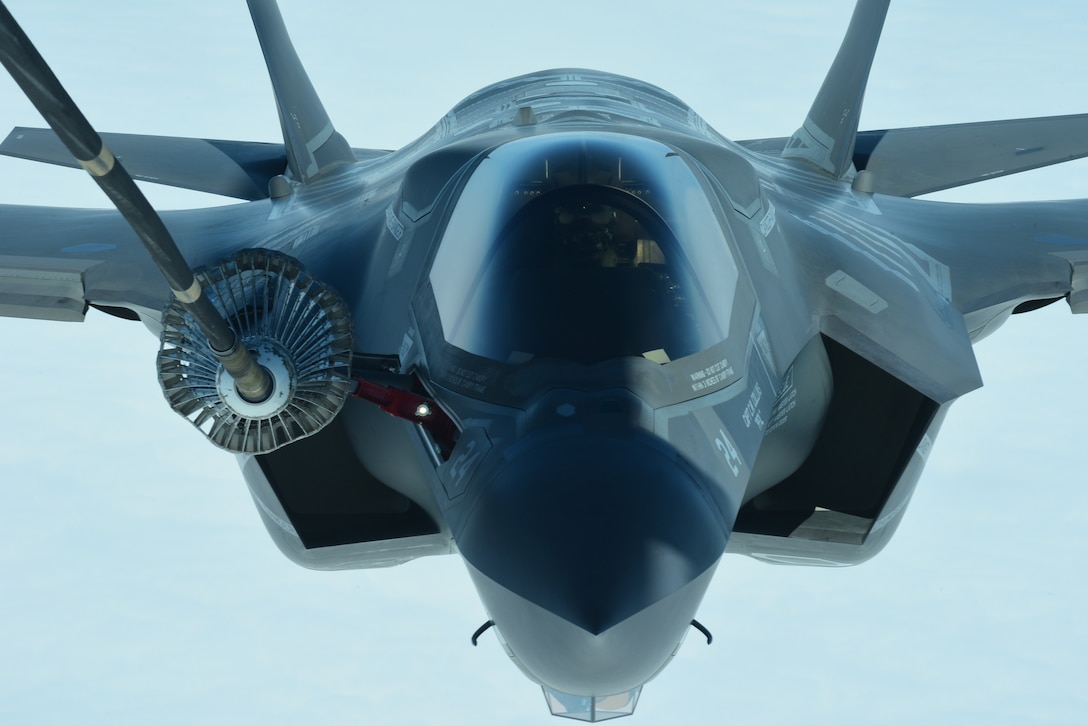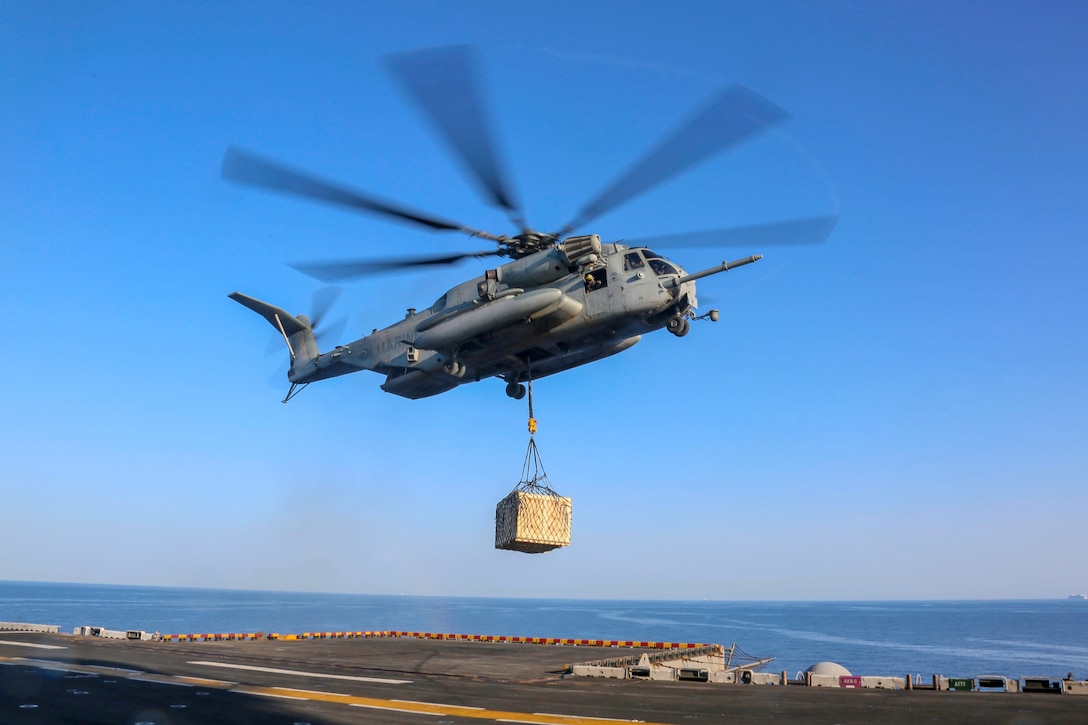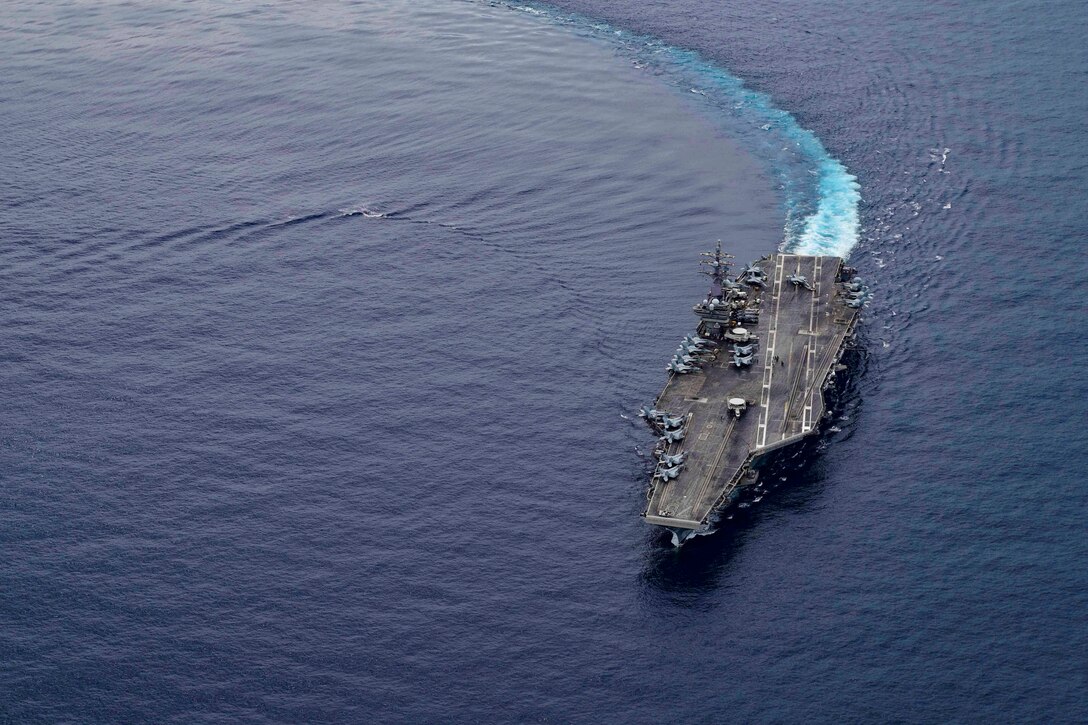Monday, July 06, 2020
Fuel Refill
A Marine Corps pilot lines up an F-35B Lightning II to refuel from a KC-10 Extender assigned to the 305th Air Mobility Wing at Joint Base McGuire-Dix-Lakehurst, N.J., July 4, 2020. The F-35B is part of a formation of military aircraft that flew over Boston, New York City, Philadelphia, Baltimore and Washington D.C. during a Salute to America event.
Sea Ops
Aircraft fly in information while the USS Nimitz and the USS Ronald Reagan carrier strike groups conduct dual carrier operations in the Indo-Pacific region, July 6, 2020.
Brits School U.S. Troops in Tea-Making, But They Prefer Coffee
The Twitterverse is atwitter....as Brits teach Americans how to make a proper cup of tea.
It's the fallout from a TikTok video that shows an American woman brewing a cup of tea in the microwave.
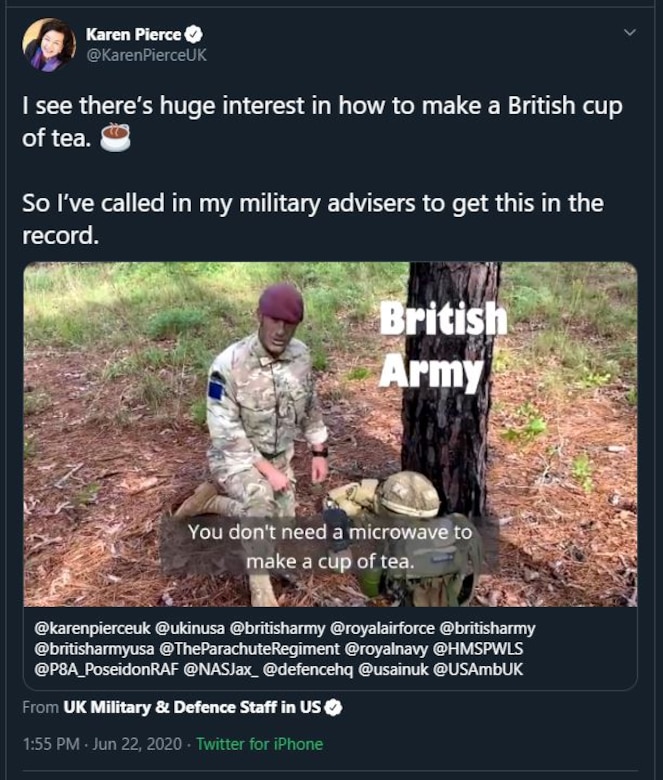
The British army, navy and air force jumped in to educate their military cousins across the pond, letting them know that brewing tea requires a kettle, tea bag, milk and sugar.
Microwaving is a faux pas, and even the order you put things in the hot water matters.
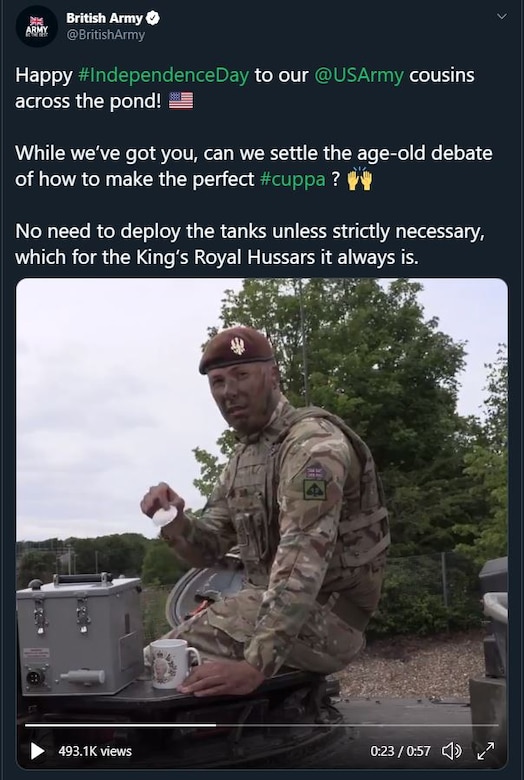
While U.S. service members applaud the British for their willingness to impart their tea-making wisdom, it may be unnecessary. Military service members of the United States of America do not — as a rule — drink tea.
Service members do, however, drink coffee, and they will go to great lengths to ensure they have their morning cups of go-juice. Coffee and service members is a tradition as time-honored as the services themselves.
In garrison, forward operating bases, and even combat outposts, there's always coffee available somewhere. Service members can grab a foam or paper cup, pour in the coffee and fix it the way they like it. At larger bases, there's even a choice of liquid creamer and fake sugar available.
For service members in the field, rations — or meals ready to eat — even come with instant coffee, powdered nondairy "creamer" and sugar. There's also a flameless heater that gets the instant coffee hot enough to burn the mouth. But if they're desperate, soldiers just dump the coffee granules into cold water, shake it and slam it down.
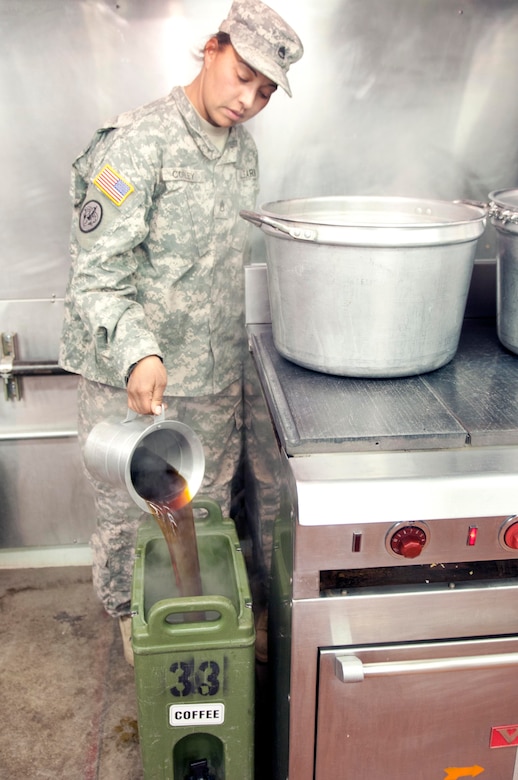
The U.S. military makes every effort to get coffee to the troops. During the Civil War, getting a hot cup of coffee was a real morale booster. Young William McKinley delivered hot coffee to his unit under fire at the battle of Antietam, Maryland — which he noted as he rose in politics, eventually being elected U.S. president in 1896.
Civil War soldiers didn't have all the accoutrements that today's coffee snob has. At every break in a march, the troops would build a fire, heat water and use their musket butts to crush the beans. They would dump them in the water, and let it steep.
According to a Navy legend, the phrase "cup of Joe" was coined after Navy Secretary Josephus Daniels outlawed booze on board ships in 1914. Coffee was the strongest drink a sailor could have.
During World War I, cooks tried to deliver hot coffee to the troops manning the trenches. Behind the lines, Red Cross volunteers called "doughnut dollies" made sure there were coffee and doughnuts for troops coming off the line or going in.
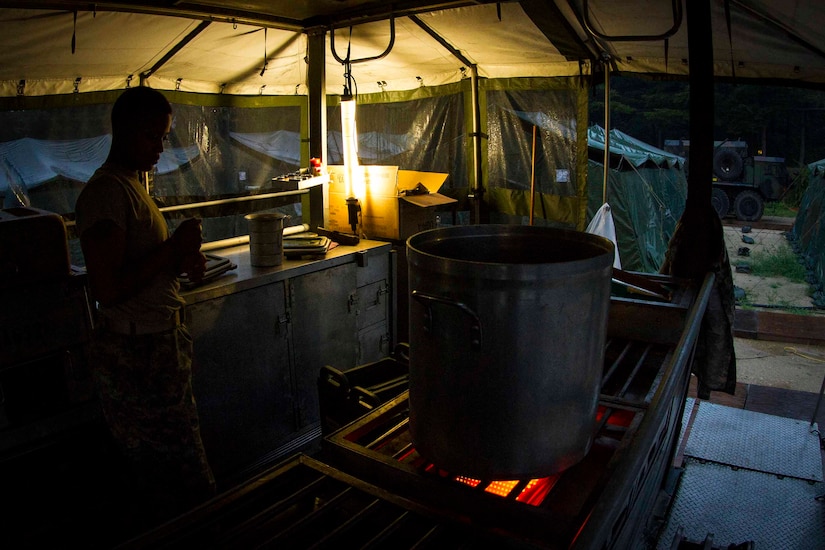
During World War II, troops from Iwo Jima to the Battle of the Bulge dug through their rations for a caffeine fix.
At the dedication of the Korean War Memorial in Washington, one Korean War vet described "sock coffee" that his Marine platoon made up by the Chosin Reservoir. They took a sock, filled it with coffee grounds, and dunked it in a canteen cup with boiling water. "We tried to get a clean sock, but we didn't care," he said.
During the Vietnam War, troops used pinches of C-4 plastic explosives to heat the coffee in their ration packets.
In 2003's Operation Iraqi Freedom, Americans sent lots and lots of coffee to the troops. In one instance, a platoon got 10 bags of Starbucks coffee, but it was whole-bean, rather than ground.
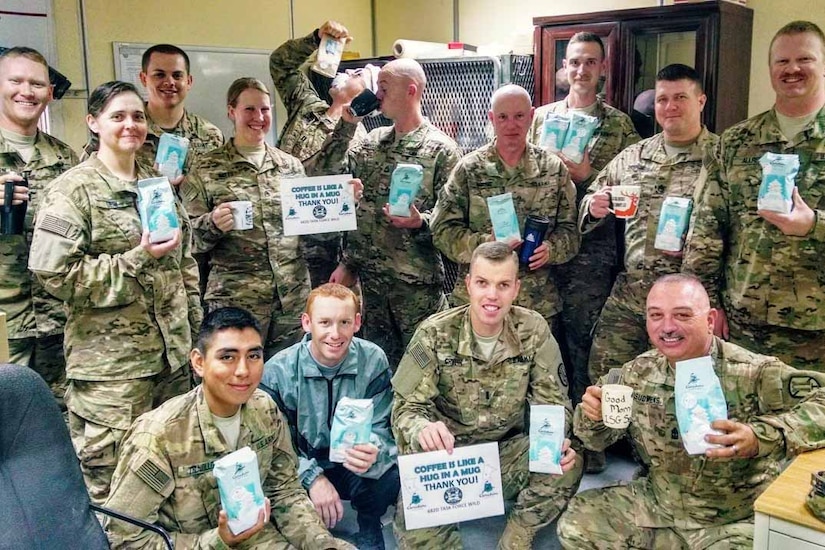
There actually was a young 3rd Infantry Division soldier who had a coffee grinder — but in all the moving, it had been broken. This same soldier took fishing poles to Baghdad, but he actually got to use those.
Someone mentioned how the troops during the Civil War had done it, and the tradition continued. The troops soon liberated a huge pot from the Baghdad International Airport, filled it with water and put it over a fire. They put the coffee beans in a plastic sandbag and used their weapons and bricks to crush them. Then they dumped the result into the boiling water.
The coffee was so strong, it would walk over to you if you whistled.
It was just what they needed.
DOD Identifies Army Casualty
The Department of Defense announced today the death of a soldier who was supporting Operation Joint Guardian.
Pfc. Alexander Blake Klass, 20, from Willamina, Oregon, died as the result of a non-combat related incident, July 4, 2020, at Camp Novo Selo, Kosovo. The incident is under investigation.
Klass was assigned to 2nd Battalion, 162nd Infantry Regiment, 41st Infantry Brigade Combat Team, Oregon National Guard, Springfield, Oregon.
For more information regarding Pfc. Alexander Blake Klass, media may contact Maj. Stephen S. Bomar, Oregon Military Department Public Affairs at stephen.s.bomar.mil@mail.mil; agpa@mil.state.or.us, or at (503) 584-3885.
Florida Guard Supports Relocation of Community-Based COVID-19 Testing Sites
Soldiers with the Florida National Guard supported local and state authorities in the move, setup and resumption of operations for two community-based COVID-19 testing sites in Broward County.
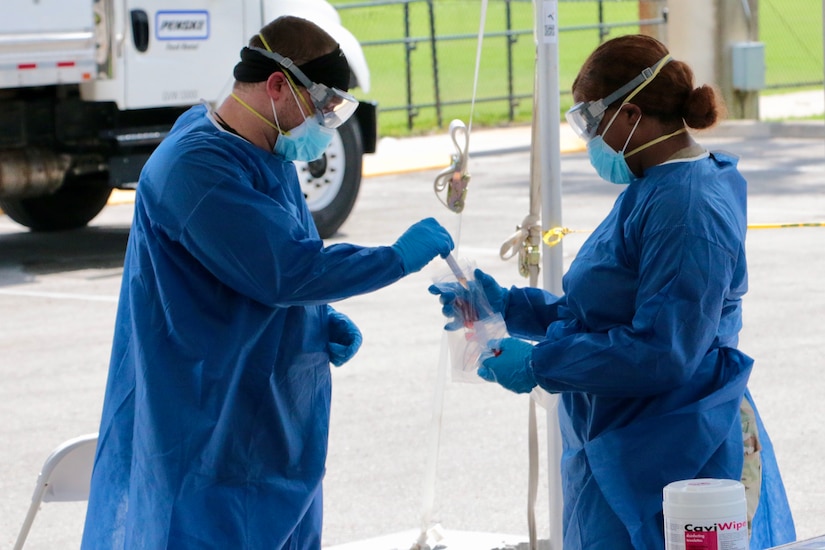
"We have been working at testing sites in Broward County since we arrived in South Florida at the beginning of June," said Army Sgt. 1st Class Thomas Jones, a noncommissioned officer assigned to Charlie Battery, 1st Battalion of the 265th Air Defense Artillery out of Deland, Florida. "We were originally assigned to the Hampton Pines testing site, but when it was moved to Lauderdale Lakes, our mission continued in the new location."
The two new test sites at the Vincent Torres Memorial Park in Lauderdale Lakes and at Lincoln Park in Fort Lauderdale replaced the Hampton Pines and Urban League CBTS locations respectively, which are now closed.
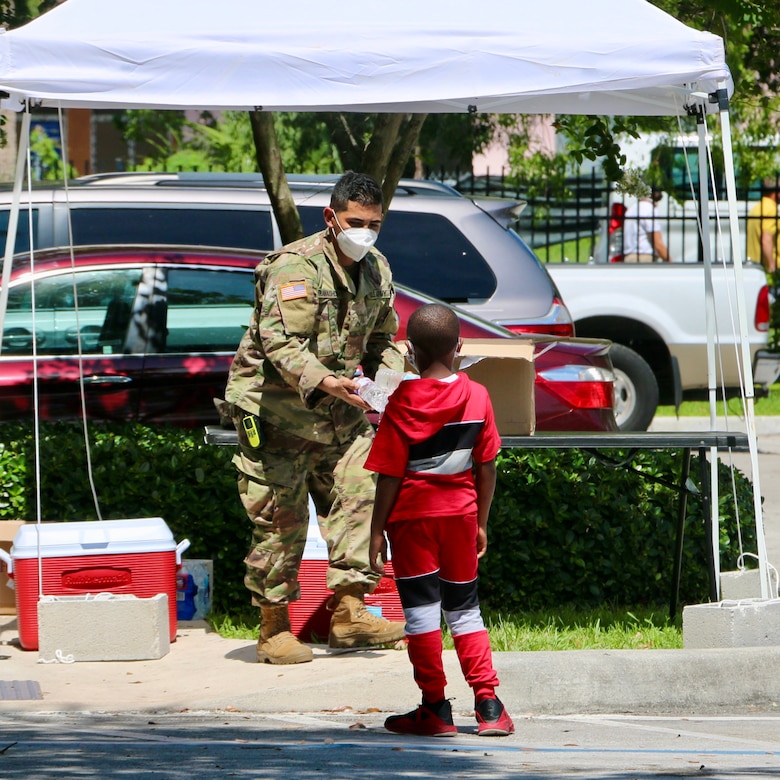
"We are here to help the community," said Army 2nd Lt. Pablo Iguaran, a platoon leader with Alpha Battery, 1-265 ADA and the officer in charge of the Lincoln Park site. "The Florida Guard can adapt very quickly, so when the move from the Urban League to Lincoln Park was announced, we were prepared to handle it without any issues."
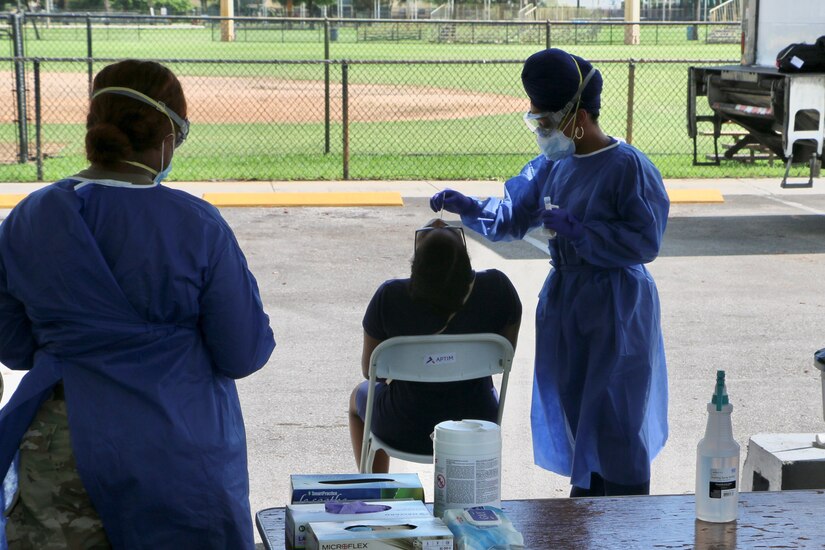
Since starting COVID-19 operations in mid-March, the 50th Regional Support Group has served as the Florida National Guard's main effort in supporting the state's COVID-19 response. Working together with federal, state and local authorities throughout Miami-Dade, Broward and Palm Beach counties, the 50th RSG and its subordinate units have provided direct and indirect support to more than a dozen CBTS locations, helping to administer more than 200,000 sample collections in their area of operations. The group’s soldiers also are supporting screening operations at three airports.
(Army Maj. Jesse Manzano is assigned to the 50th Regional Support Group.)
Army Adapts NCO Education in Response to COVID-19 Pandemic
More than 200 enlisted soldiers serving throughout the Middle East and Africa were slated to travel to Kuwait for the Army's Basic Leader Course in March. Then the military banned nonessential travel in response to the increasing threat of COVID-19.
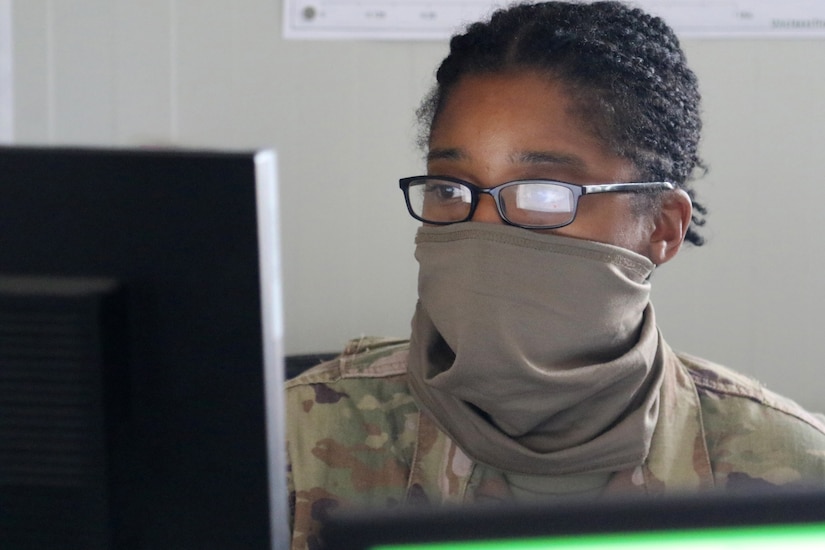
"I found out I wasn't going to BLC the day I was leaving," said Army Sgt. Robert M. Raitano, the noncommissioned officer in charge of intelligence with the 207th Regional Support Group. "My bags were packed."
The three-week course is crucial for young soldiers. It is the first official step in learning how to be a noncommissioned officer, and the class is required before they can be promoted to sergeant. Even if personnel can get a waiver while on deployment, they still are required to attend the school when they return to the United States.
Some soldiers had waited for years for the opportunity to take the course. Army Sgt. Aquenda R. Roundtree, the operations noncommissioned officer in charge with the 248th Area Support Medical Company, said she had been trying to go to the school since 2017, but her transfers among various Georgia National Guard units derailed those efforts. The latest cancellation promised another long delay.
"I was, like, 'Wow – again?'" she said, "because they kept pushing it back."
In April, the NCO Leadership Center of Excellence delivered a solution: an online version of the class supplemented by instructors stationed at each base. Despite the course being primarily online, the students were still required to lead physical fitness training while maintaining social distancing requirements.
The students' units provided the assistant instructors. At Al Asad Air Base, Iraq, the 207th Regional Support Group and the 248th Area Support Medical Company combined efforts to create a class for five students. Army Staff Sgt. Heather Bojarski, a small group leader with the U.S. Central Command NCO Academy at Camp Buehring, said other participants were spread throughout more than a half-dozen countries – all reporting back to the school in Kuwait.
The assistant instructors at Al Asad attempted to recreate a school environment as much as possible. They reserved a meeting room and had internet connections installed so the students could train together. The NCOs scheduled physical training sessions in the morning prior to classes and had the students march to meals together to practice drill and ceremonies.
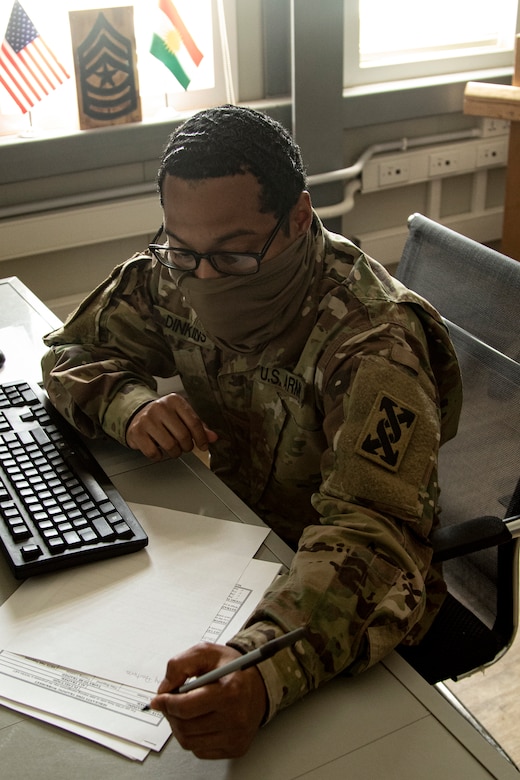
"I was thinking we'd just be sitting there online all the time," Roundtree said. "I didn't expect everything that happened."
During class hours, students regularly responded to questions and reacted to each other's discussion points using their laptops. Outside of class, they had to prepare written papers and a public speaking presentation. Roundtree, who was the first student to serve as class leader, helped ingrain the standards and common procedures their group followed throughout.
"We always tried to stay ahead of the game," she said. "Everyone was held accountable so nobody fell behind."
Raitano, who said he originally joined the military five years ago with no specific goals in mind, said the class helped him clarify his understanding of leadership, followership and what kind of person he wants to be. He zeroed in on servant leadership, particularly after helping classmates with the required school tasks.
"It took constant hours of practice and preparation," he said. "Being able to see results from that was very inspiring."
Teamwork became essential as the students aided each other in their studies and practices for the practical exams. Students gathered after class hours to work on drills.
"We never really had a moment where we feuded or didn't agree with each other," Raitano said. "We came together fairly well."
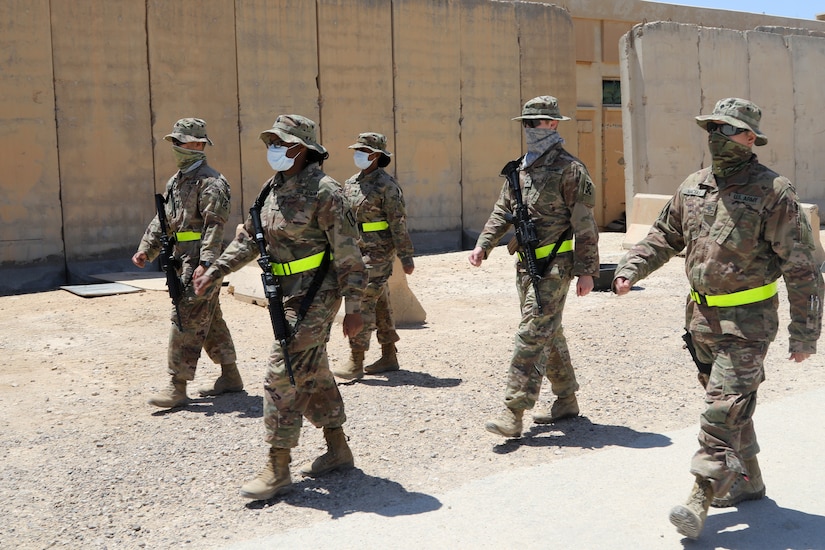
Both Raitano and Roundtree, similar to others in their class, received their promotion to sergeant shortly after graduating.
"There were a lot of things I didn't know," Raitano said of the lessons he learned from the classes. "There are things I will pick up and use in my day-to-day life."
From her office in Kuwait, Bojarski said the remote class program has continued to be successful. According to the school, out of 201 students in the first class, 193 graduated in May. The second class started in June.
"I liked the challenge," she said of the emergency BLC. "I liked that it tapped our resiliency….and it pushed me to think outside the box."
The unique situation has led to the innovative use of technology in some cases. When one of the students was having trouble passing their physical resilience training drills, the assistant instructor used a video call to contact Bojarski and let her watch for issues.
"I could actually see what the sergeant was doing," she said.
Likewise, in subsequent BLC classes the school increased its use of the online Defense Collaboration System, which has increased the small-group leaders' ability to communicate with remote students every day.
"It made me more accessible to them," she said, noting it allowed them to problem solve together. "That's what we're here for."
(Army Sgt. 1st Class Gary Witte is assigned to the 207th Regional Support Group.)
Fitness Center at Joint Base Charleston Opens With Restrictions
The 628th Force Support Squadron's operations have recently started back up, including the opening of the Air Base Fitness Center at Joint Base Charleston, South Carolina, with restrictions in place due to COVID-19.
"When the military members come in, they have to have on a mask," said Air Force Master Sgt. Sandra Coleman, the fitness and sports section chief with the 628th FSS. "We go over the COVID-19 questionnaire, and we also have our rules printed out. The newest thing is that customers do not have to wear a mask while they're working out. As they transition from equipment or machines, they do have to put their mask back on. They have to abide by the room capacity numbers and maintain a minimum of 6 feet of physical distance."
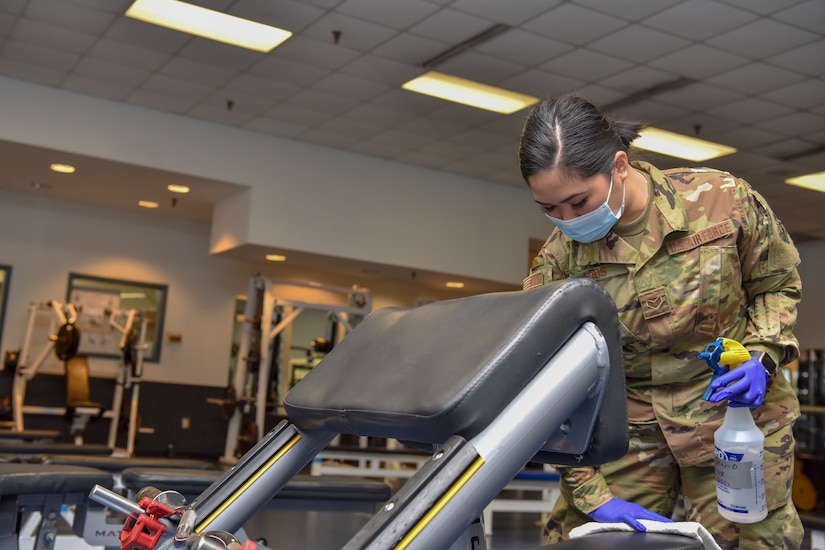 |
Coleman added that the fitness center team has spaced all the equipment out to ensure compliance with social distancing guidelines.
"Customers must wipe down all equipment bars, handles, seats, etc.," she said. "There is no equipment that will be handed out, and all members must exit through the hurricane port into the lobby, where they will check out with us. Also, personnel must come in proper fitness attire — changing is not permitted."
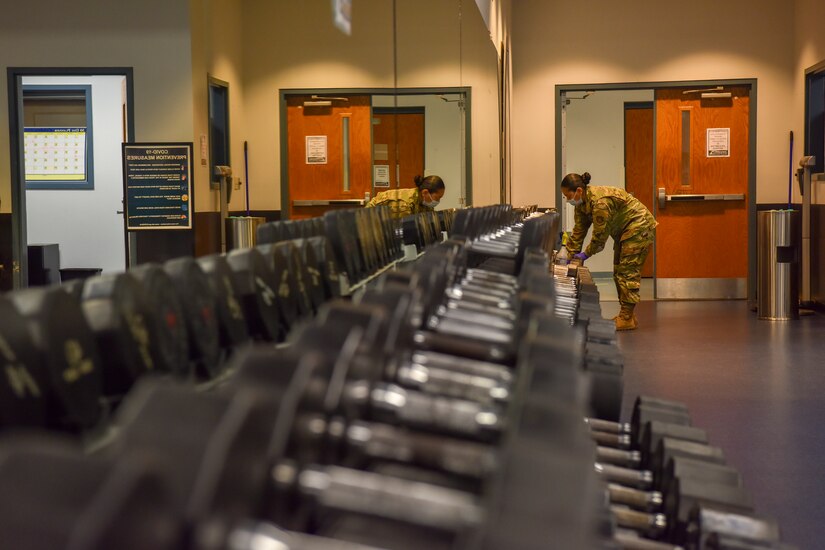
Air Force 1st Lt. Brian Boarman, the officer in charge of fitness and sports, outlined the gym facilities that remain closed.
"Our parent-child room is closed," he said. "The spin room, the racquetball courts, the Alpha Warrior rig and the aerobics room are all closed, as well as the locker rooms, the sauna and the showers."
Boarman also listed who is allowed in the Air Base Fitness Center and what times they are allowed to be there.
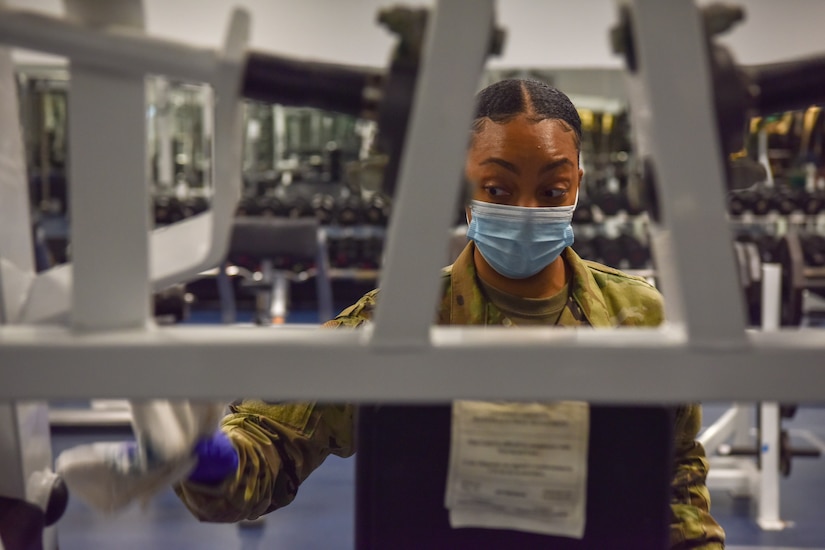
"Right now it is all active duty, guard and reserve members only," he said "We do not have 24-hour access right now, nor do we have weekend hours. The reason is we wouldn't have the staff to clean it. We're open Monday through Friday from 6 a.m. to 8 p.m."
Trail Tradition
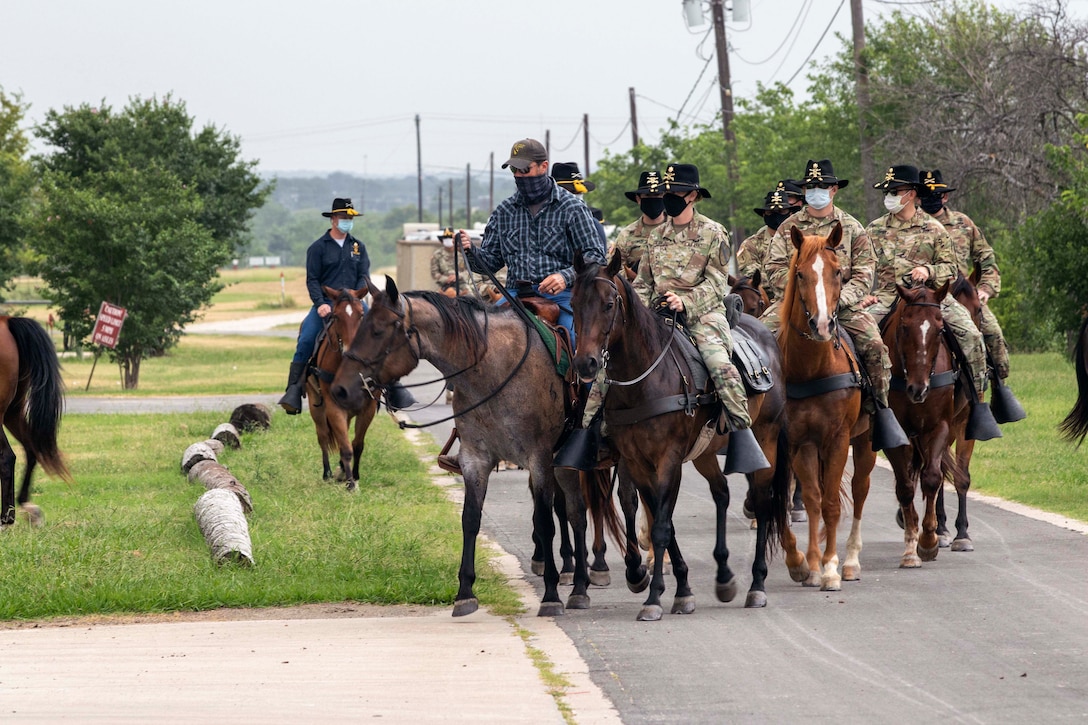 |
Soldiers participate in a trail ride led by the 1st Cavalry Division Horse Detachment at Fort Hood, Texas, July 1, 2020.
Cargo Delivery
A Marine Corps CH-53E Super Stallion prepares to place cargo on the flight deck of the USS Bataan in the Atlantic Ocean, June 29, 2020.
Routine Ops
The USS Ronald Reagan steams through international waters while conducting routine flight operations in the South China Sea, July 4, 2020.
Flag Officer Announcement
Secretary of Defense Dr. Mark T. Esper announced today that the president has made the following nomination:
Navy Capt. Trent R. Demoss for appointment to the rank of rear admiral (lower half). Demoss is currently serving as vice commander, Fleet Readiness Center, Patuxent River, Maryland.
General Officer Announcement
Secretary of Defense Dr. Mark T. Esper announced today that the president has made the following nomination:
Marine Corps Col. David Nathanson for appointment to the rank of brigadier general. Nathanson is currently serving as the assistant chief of staff, G-4, I Marine Expeditionary Force, Camp Pendleton, California.
General Officer Announcements
Secretary of Defense Dr. Mark T. Esper announced today that the president has made the following nominations:
Air Force Lt. Gen. Glen D. VanHerck for appointment to the rank of general, with assignment as commander, U.S. Northern Command; and commander, North American Aerospace Defense Command, Peterson Air Force Base, Colorado. VanHerck is currently serving as director, Joint Staff, Pentagon, Washington, D.C.
Air Force Lt. Gen. Richard M. Clark for appointment to the rank of lieutenant general, with assignment as superintendent, U.S. Air Force Academy, Colorado Springs, Colorado. Clark is currently serving as deputy chief of staff, strategic deterrence and nuclear integration, Headquarters U.S. Air Force, Pentagon, Washington, D.C.
Air Force Maj. Gen. Tony D. Bauernfeind for appointment to the rank of lieutenant general, with assignment as vice commander, U.S. Special Operations Command, Pentagon, Washington, D.C. Bauernfeind is currently serving as chief of staff, Headquarters U.S. Special Operations Command, MacDill Air Force Base, Florida.
Air Force Maj. Gen. Jeffrey A. Kruse for appointment to the rank of lieutenant general, with assignment as the director’s advisor for military affairs, Office of the Director of National Intelligence, McLean, Virginia. Kruse is currently serving as director for defense intelligence (warfighter support), Office of the Under Secretary of Defense (Intelligence), Pentagon, Washington, D.C.
